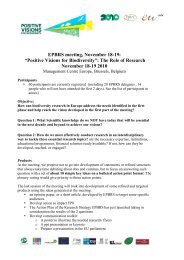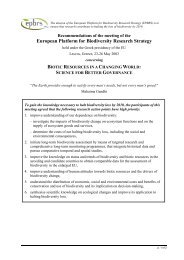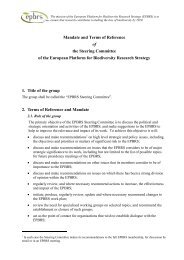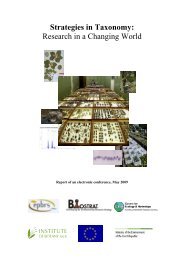Evaluation of the effectiveness of the New Instruments of ... - CORDIS
Evaluation of the effectiveness of the New Instruments of ... - CORDIS
Evaluation of the effectiveness of the New Instruments of ... - CORDIS
You also want an ePaper? Increase the reach of your titles
YUMPU automatically turns print PDFs into web optimized ePapers that Google loves.
• The difficulty to reduce <strong>the</strong> size <strong>of</strong> consortia: based on first information received<br />
and also <strong>the</strong> EOI exercise, consortia were sometimes very large. It is very difficult<br />
later on to reduce. This has led to management problems consortia which are bigger<br />
than necessary.<br />
• The high level <strong>of</strong> responsibility for <strong>the</strong> coordinator to organise <strong>the</strong> application<br />
process.<br />
• The level <strong>of</strong> investment for <strong>the</strong> preparation <strong>of</strong> a proposal. Examples <strong>of</strong> costs<br />
mentioned were all (well) above 100 000 Euro, and up to 1.2 million Euro (in<br />
particular given <strong>the</strong> low expected success rate).<br />
• Various examples were given <strong>of</strong> <strong>the</strong> difficulty to involve SMEs. There are barriers to<br />
<strong>the</strong>ir participation (availability <strong>of</strong> 1 or 2 experts to prepare <strong>the</strong> proposal; difficulty to<br />
plan over 4 year period) and <strong>the</strong>y seem difficult to motivate for participation.<br />
Why is industry more reluctant:<br />
• Lower average grant per participant per year in FP6<br />
• The large size <strong>of</strong> consortia is creating barriers: less focus, results are less concrete,<br />
risks associated with managing such projects<br />
• Lack <strong>of</strong> strategic character <strong>of</strong> many proposals.<br />
• Large industry is approached by scientists to take a management role (IPs). They<br />
tend to refuse due to <strong>the</strong> high responsibility and risks.<br />
• SMEs are difficult to involve: low motivation is <strong>the</strong> main barrier, coupled to limited<br />
resources (both for preparing <strong>the</strong> application and for execution).<br />
Direct contact with EC <strong>of</strong>ficials is a major source <strong>of</strong> information in <strong>the</strong> preparation process,<br />
mainly resulting from <strong>the</strong> conviction <strong>of</strong> several participants that <strong>the</strong>re are “additional rules”<br />
which <strong>the</strong>y need to know when preparing <strong>the</strong>ir proposal.<br />
III. Issues related to <strong>the</strong> evaluation process<br />
Main observations<br />
• The participants mentioned a good quality level <strong>of</strong> <strong>the</strong> evaluation process. However,<br />
no consensus was reached regarding <strong>the</strong> feedback and in particular <strong>the</strong> satisfactory<br />
character <strong>of</strong> <strong>the</strong> ESR (evaluation summary report). In Prague, <strong>the</strong> need to receive a<br />
feedback that allows learning and improving was expressed even more strongly.<br />
• There is consensus on <strong>the</strong> fact nothing better exists than a peer review, but concerns<br />
were expressed regarding <strong>the</strong> selection <strong>of</strong> evaluators given that, for <strong>the</strong> new<br />
<strong>Instruments</strong> it is not easy to find Europeans which are impartial and outside <strong>the</strong> EU it<br />
is not necessarily easy to recruit high quality evaluators.<br />
• Mixed views regarding <strong>the</strong> two stage evaluation (as applied by <strong>the</strong>matic priority 3,<br />
NMP). For some it was perceived as not having been efficietly implemented, while for<br />
o<strong>the</strong>rs it was seen as a way to reduce unnecessary application costs. The principle to<br />
balance effort and chance <strong>of</strong> success is perceived as a necessary goal.<br />
• The budget cuts were perceived as not linked to <strong>the</strong> evaluation result, and against<br />
<strong>the</strong> principle <strong>of</strong> <strong>the</strong> <strong>New</strong> <strong>Instruments</strong>.<br />
O<strong>the</strong>r observations:<br />
• Suggestions were made as to invest in <strong>the</strong> training <strong>of</strong> evaluators. Examples were<br />
given <strong>of</strong> inconsistencies or examples <strong>of</strong> decisions showing misinterpretations <strong>of</strong> new<br />
instruments by evaluators.<br />
70









